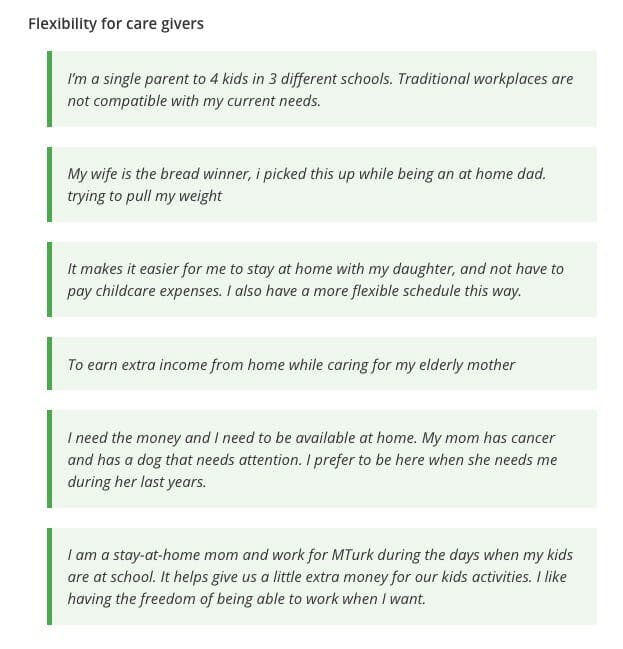Opinion
“A man is less responsible for rape if he is affected by drugs or alcohol.” I quickly clicked my mouse over to the right button, “Strongly Disagree.” My eyes burned. I had answered this question three times this week. This particular survey would take “just ten minutes” and would give me 20 cents, bringing my hourly wage to $3.88 for the day. I finished and reached the debrief: It was a study about economics. The trigger warning-less questions I had answered on sexual assault were simply diversions to disorient research subjects.
I am one of the over 500,000 workers voluntarily doing my time in Amazon’s digital sweatshop. I am literally paid pennies for my thoughts: my deepest fears, traumatic memories, and my family’s medical history.
Amazon Mechanical Turking is a form of microwork, or a series of small tasks that computers and AI haven’t figured out how to do without humans yet. Microtasks are anything from transcribing a blurry receipt to filling out psychological surveys to helping a startup choose a name that resonates. Without microwork, large corporations and researchers at big universities wouldn’t be able to conduct up-to-the-minute market research, or make studies about the human condition, or test whether their app rollout will crash and burn.
I started Turking this fall to earn a little extra cash for some fun trips I have planned. I made about $250 completing 700 microtasks with Amazon. For many, microworking isn’t side money: It’s a second job. It’s a way for stay-at-home moms, ex-cons, people deep in debt, and disabled individuals to make working from home work for them. For international workers in second- and third-world countries, wages can be as competitive as an office job. But for U.S. workers who are new to microworking, this can mean rates as low as $2-$3 an hour with no compensation for self-employed overhead, healthcare, or other benefits.

Turkopticon, a requester review site, ranks the fairness of Turking jobs posted by “requesters,” or microworker bosses. Requesters are most often researchers at university science labs, tech companies (like YouTube and Pinterest), and corporations (media outlets, department stores, food brands, you name it). In other words, these requesters handing out pennies are often million- and billion-dollar institutions.
While there are some microworking sites that pay at or over the minimum hourly wage for tasks, like UserTesting and Prolific.ac, they are few and far between. The major sites like Amazon Mechanical Turking, Crowdflower, and Clickworker don’t pay federally mandated minimum wages. Even if they wanted to, they lack the infrastructure to regulate fair work. Amazon has no limit on how low you can go in exchange for anyone’s time—I’ve seen $0.00 requests—and the company does not mediate in payment disputes or monitor content. Requesters are required to tell Turkers how much time a task will take, but often it’s wildly underestimated and tasks take double or triple time. This results in workers feeling like they’re racing to finish tasks as quickly as possible.
Amazon Mechanical Turk isn’t just an open market. They’re much more complicit. The company gets a 25-40 percent commission from every request and has likely made millions off the backs of microworkers.
It’s amazing to see how brazen requesters are to compensate workers as low as $.01 for tasks that take up to three minutes. For example, a recent HIT (Human Intelligence Task) asked Amazon workers to transcribe one minute of audio for $.05, a task that typically takes three to four minutes.
According to a 2016 study conducted by the Pew Research Center, 91 percent of Amazon Turkers make under $8 an hour before taxes. What this study fails to mention is that there’s a learning curve to becoming an efficient microworker with Amazon, even if the work itself is incredibly mundane and requires little brain power.
First, one must have the forethought to download countless scripts and programs that make Turking efficient and worthwhile by shortening the process of finding opportunities you are qualified for. Make a mistake or work too slowly, and the requester doesn’t have to pay at all. Mistakes are up to the requester’s discretion; workers have no recourse. Really “good” HITs (ones paying minimum wage plus) can usually only be accessed if you have high approval ratings (above 95 percent tasks accepted by the requester), or have done over 1000 HITs. Furthermore, there’s a class of Turkers called “Masters” who have been randomly granted access to VIP-level tasks. How or why people get moved up past this digital rope is a total mystery, one that Amazon refuses to clear up.
Most of the higher paid work offered by Amazon requesters includes psychological studies. These questionnaires often require participants to reveal anonymous yet personal data about traumatic experiences like serving in war or experiencing sexual assault.

Computer scientist Jaron Lanier speculated that the low wages are because Mechanical Turk “allows you to think of the people as software components” that conjures “a sense of magic, as if you can just pluck results out of the cloud at an incredibly low cost.”
But people aren’t computers, and we shouldn’t be treated as such. A couple bucks per hour (like the many $1 for 45-minute studies) is meager in exchange for our human experiences.
Regardless of what kind of work is being done, or how “easy” it is, microworking should pay the U.S. federal minimum wage—especially since the majority of Amazon workers are located in the United States. Corporations requesting microtasks be completed by human beings need to be held to the same standard as other U.S. businesses. While workers are free to choose when they work and how many HITs they do, employers should not be free to choose which human rights to abide by and which fall under “independent contractor” laws.
So why haven’t these workers collectively bargained or banned together to demand higher wages? It’s a question that comes up weekly on social news site Reddit. And while it may seem impossible to organize hundreds of thousands of workers in a covert workforce, it’s not impossible.
In Germany and Austria, bills of rights for crowdworkers have already been enacted, and several unions like The ÖGB and IG Metall have offered union membership to microworkers. A year ago, a coalition of European and North American unions (including the Teamsters 117, which represents 16,000 workers in the state of Washington) collaborated on the Frankfurt Declaration on Platform-Based Work, which asked companies like Amazon to abide by simple guidelines for digital work.
The declaration rightfully claimed that if our democratic societies want to remain democratic, “workers must have democratic influence over the governance of work,” regardless of whether the work is globalized, digitalized or “flexibilized.” Warning against the rise of “digital feudalism,” the unions asked platforms to clarify employment statuses of their workers, ensure minimum wage and social protections like health insurance, and increase transparency.
For a company that is building a robot army and treats its warehouse workers “like cattle,” it doesn’t surprise me that Amazon ignored these simple asks. But if the question is whether microworkers should be guaranteed the same rights as regular workers, the answer is a resounding yes.
How much difference is there between a 1900s tenement that churns out shirts by the minute and a person unable to work outside their home sitting in front of a computer taking academic surveys as quickly as possible? Labor laws were enacted to prevent the former from being injurious and exploitative. It’s time we should do the same for microworkers.



